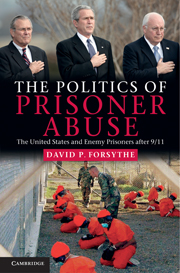Book contents
- Frontmatter
- Contents
- Preface
- List of abbreviations and acronyms
- 1 Torture and political morality in historical perspective
- 2 Political morality and the Bush Administration
- 3 Bush lawyers: the politics of legal interpretation
- 4 The military: Afghanistan, Guantánamo, Iraq
- 5 The CIA: kidnapping, Black Sites, extraordinary rendition
- 6 Due process: detention classification, Military Commissions
- 7 Prisoner abuse and the politics of transitional justice
- Annex A Cast of principal characters
- Annex B Reports on US policy toward enemy prisoners
- Annex C Some relevant legal norms: selected provisions
- Annex D Timeline, selected events, Bush Administration
- Index
- References
3 - Bush lawyers: the politics of legal interpretation
Published online by Cambridge University Press: 05 June 2012
- Frontmatter
- Contents
- Preface
- List of abbreviations and acronyms
- 1 Torture and political morality in historical perspective
- 2 Political morality and the Bush Administration
- 3 Bush lawyers: the politics of legal interpretation
- 4 The military: Afghanistan, Guantánamo, Iraq
- 5 The CIA: kidnapping, Black Sites, extraordinary rendition
- 6 Due process: detention classification, Military Commissions
- 7 Prisoner abuse and the politics of transitional justice
- Annex A Cast of principal characters
- Annex B Reports on US policy toward enemy prisoners
- Annex C Some relevant legal norms: selected provisions
- Annex D Timeline, selected events, Bush Administration
- Index
- References
Summary
Before you can torture anyone, you must first torture the law.
(Richard Cohen, Washington Post, April 28, 2009)Not since the Nazi era have so many lawyers been so clearly involved in international crimes concerning the treatment and interrogation of persons detained in war.
(Jordan J. Paust, Capt., US Army (ret.), Columbia Journal of Transnational Law, 2005)The United States professes to be a nation committed to democracy and the rule of law, under which liberal or humane values are supposed to loom large. After all, the Nazis had laws, too, so rule of law per se is not the issue. For liberal democracies the point is to use law to formalize and lock-in a commitment to liberal values such as human rights and human dignity. The real test comes in hard cases where it is not easy and self-evident to apply a law of liberal values. Many of these hard cases arise when democratic governments think they face genuine national emergencies that threaten the life of the nation. Most of the principal officials in the Bush Administration thought that 9/11 presented such a hard case. Colin Powell did not (at least after he left office), believing that Osama bin Laden and Al-Qaeda did not present an existential threat to the United States, and believing that Washington should respond to terrorism like Spain and some of its other European partners – with better intelligence and policing, but not a “global war” and foreign invasion and abuse of enemy prisoners.
- Type
- Chapter
- Information
- The Politics of Prisoner AbuseThe United States and Enemy Prisoners after 9/11, pp. 60 - 94Publisher: Cambridge University PressPrint publication year: 2011

